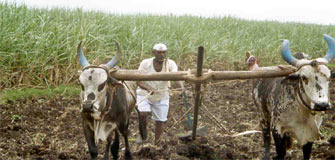Excessive amounts of pesticides and chemical fertilizers may be poisoning huge tracts in India, but there are small islands of sanity that are showing the way out of the poison spiral. One of them is Nasik district in Maharashtra. Over 600 farmers here have completely switched to organic farming. There is no looking back, and there are no regrets.
Ask Abhilash Gorhe. He moved into farming after studying engineering at college. He used huge quantities of chemical fertilizer and pesticides. He was happy with his yields, and the good bank balance that went with it. But one day he asked himself what he was doing cultivating poison and then packaging it to ruin the health of the thousands who were consuming what he grew. That was it. He made a turnaround to organic farming using homegrown bio-pesticides and manure from the stables at the back of his house. If the manure fell short, he would buy it from suppliers in Mumbai. Initially his yields fell, but things are now picking up. The land he farms is rejuvenating to its natural health.

![]() Picture:
An organic farmer ploughs his field in Nasik
Picture:
An organic farmer ploughs his field in Nasik
Friendly insects like black ants that are natural predators of pests are crawling all over his grape orchard making a hearty meal of the pests. Says he: Ninety-nine per cent of the pests are non-vegetarian and so end up eating other pests. Nature created a perfect system. But since we use so much of chemicals, these pests die. Also natural predators like sparrows which used to eat pests are now disappearing.
Gorhe is now teaching other farmers to use leaves of various plants like the papaya, castor and custard apple to make bio-pesticides. Cow urine and buttermilk are also used to make potions to keep the pests away. None of this is rocket science. These traditional methods were used for decades, but forgotten during the Green Revolution; now they are being rediscovered as safe and affordable alternatives.
Marigold flowers sprout in Gorhes farm and he loves to see butterflies flitting around. He never planted the flower saplings. They just grew wild. When he used to use the pesticides, there were no birds, there were no butterflies. Now, they are numerous.
The enthusiasm of farmers like him is contagious. Many others are now switching to organic farming. Umesh Bagde of Vadel village in Malegaon tehsil is now organically growing pomegrantates in his orchard. He has seen a dramatic change of taste in his fruits; they are sweeter than ever before. He gets a decent price for hem. Says Bagde: I now feel a sense of fulfillment as my fruits are now free of poison. Atleast now I am not harming anyone with pesticides.
The fact that even some grape orchards have turned organic is remarkable. Nasik has large grape farms that annually pump in pesticides worth Rs. 40 to 60 thousand per acre. Desperate to ensure a good price, some farmers reportedly dip bunches of grapes after harvesting into insecticide so that flies and other insects do not sit on them and pockmark the fruit. Going organic is a big swing away from the old ways for grape farmers.
Nasik farmers who are now into organic farming remark jovially that their farms are a lot better than they look; the dead leaves strewn about are deliberately scattered to decompose and mix with the soil. Weeds are left alone; they too are part of the eco-system.
The agricultural extension officers of the government, who are supposed to advise farmers, are never seen. Pesticide dealers have filled this void by doubling as advisors on what to sow, how much pesticides and fertilizers to use, and so on.
• An easier choice
• To combat pesticide residues
